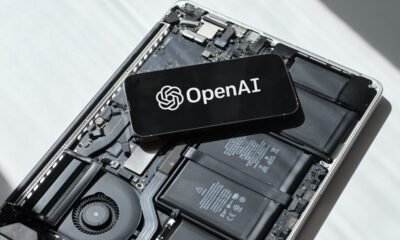Business
The “Boring” AI Business Model Making Millionaires in 2025

In 2025, while the world gushed about flashy robots, talking cars, and futuristic gadgets, a group of young people quietly built an AI business so unremarkable at first glance that almost nobody noticed it. It wasn’t glamorous, it didn’t have a viral video, and it didn’t try to predict the next big trend. But it was making millionaires out of regular people… people who had nothing but grit, curiosity, and patience.
This is the story of Maya and her “boring” AI model, and how it reshaped not only her life but the lives of thousands who followed her blueprint.
Maya was 27 in early 2024, living in a one-bedroom apartment above a grocery store in a crowded city. She had a degree in literature, not engineering, and worked as a night-shift clerk in a local print shop.
She had no investors, no startup culture contacts, and no idea how to code beyond simple website builders. But she had two assets few people had: relentless curiosity and the habit of looking for problems that nobody wanted to solve.
One evening, while scrolling through forums about small business challenges, she noticed dozens of owners complaining about repetitive, mundane tasks: sorting invoices, tagging emails, filing customer questions, and moving data from one platform to another. It wasn’t glamorous work. It wasn’t on the cover of magazines. But it was expensive and time-consuming.
And something clicked.
“What if AI could quietly do all these boring tasks?” she wondered.
While the tech world chased billion-dollar breakthroughs in self-driving cars and virtual universes, Maya started tinkering with the “unsexy” side of artificial intelligence. She didn’t try to build a sentient assistant. Instead, she built small, focused AI “micro-tools” that automated the ugly, tedious back-office work of everyday businesses.
Maya’s first tool wasn’t impressive. It was a simple AI model that read PDF invoices, extracted key data, and entered it into spreadsheets for small business owners. She found an open-source language model online, watched tutorials for weeks, and cobbled together an interface using no-code platforms. She spent nights testing it on free samples and begging café owners to try it.
Her first paying client was a family-run furniture shop. They hated doing paperwork at the end of every week. Maya’s tool reduced their 6-hour weekly process to 30 minutes. They paid her $50 a month. She danced around her apartment with joy.
But Maya didn’t stop. She built a second micro-tool to categorize customer emails into urgency levels. A third to predict low inventory items. Each small AI bot solved one tiny, boring problem. Together, they saved small businesses hundreds of hours.
By mid-2024, Maya had 47 clients paying $30-$200 a month. Not life-changing, but enough to quit her print shop job. She then created subscription tiers and white-labeled her micro-tools so other freelancers could sell them too. Her pitch wasn’t sexy; it was practical. “Save time. Save money. Grow quietly.”
This was the turning point.
A former schoolteacher named Daniel, 32, bought a license to resell Maya’s AI bots in his own city. He signed up 20 businesses in a month. He made more than he’d made teaching full-time. A retired accountant named Lucia, 58, did the same. She introduced the tools to her network of small retailers and built a six-figure income in a year.
The “boring” AI model had become a movement… not of tech moguls, but of ordinary people solving ordinary problems.
Maya’s philosophy was simple:
Don’t chase hype.
Solve persistent problems.
Keep costs low and margins healthy.
Let others partner and profit.
Instead of selling one giant software platform, she sold dozens of tiny, niche AI “workers” that anyone could subscribe to individually. This modular approach allowed even small-town businesses to adopt AI at their own pace.
By early 2025, hundreds of resellers around the world were using Maya’s framework to deliver micro-AI services. Some ran one-person operations; others built small agencies. They weren’t Silicon Valley founders… they were baristas, teachers, retirees, and college kids who saw a need and used Maya’s blueprint.
One such story was Sophie, a 21-year-old student who had grown up watching her parents run a bakery. Sophie bought Maya’s AI invoicing and scheduling tools, customized them with her own branding, and started selling them to bakeries and cafés in her region. Within six months, she’d replaced her part-time job income. Within a year, she was making $12,000 a month… enough to pay off her student loans before graduating.
Then there was Amir, 44, a former mechanic who lost his job during an economic downturn. He learned how to use Maya’s training materials, packaged AI bots for auto shops, and made more money in his first year of self-employment than he ever had before.
The model worked because it wasn’t glamorous. No flashy ads. No wild claims. Just steady value. Maya called it “AI plumbing”… building the pipes that let small businesses run smoother.
She focused on four principles:
1. Accessibility: Make it cheap and easy enough for non-tech people.
2. Education: Offer plain-language training and support.
3. Flexibility: Let resellers white-label and adjust pricing.
4. Community: Encourage sharing improvements and templates.
By mid-2025, Maya herself wasn’t just running a business. She was leading a decentralized movement of AI micro-entrepreneurs. Her own income grew into the millions, but she always reinvested in building better training and tools.
And yet Maya stayed humble. She still lived in a modest apartment, still answered customer support emails personally, and still said no to investors who wanted to “scale aggressively.” She believed the real revolution wasn’t another billion-dollar tech giant but thousands of small, empowered entrepreneurs earning honest incomes from useful AI tools.
Her success attracted skepticism. Some said it was too simple. Others thought the big companies would crush her. But Maya knew she was in a different lane. She wasn’t trying to win a popularity contest… she was trying to solve real problems.
And as the economy shifted in 2025, her approach turned out to be exactly what people needed: stability, low overhead, and the ability to start small.
By late 2025, analysts began to notice. Articles described the phenomenon of “boring AI” making quiet millionaires. But those inside the movement already knew: it wasn’t about hype. It was about mindset.
Maya often told her community:
“Find a problem. Build the simplest AI solution. Offer it to the people who need it most. Repeat. Don’t try to impress. Try to improve.”
It was a model anyone could adopt. A 19-year-old in Manila built AI tools for local fishermen to predict tide patterns. A 63-year-old in Nairobi used AI bots to help farmers monitor soil moisture. A single mom in Toronto built an AI appointment scheduler for local hair salons. The stories poured in, all rooted in the same principle: simple solutions, consistent effort, and community sharing.
Maya had proven something profound:
You don’t need to invent the next flying car to become successful. You can build “boring” tools that make life easier… and people will pay for that forever.
Moral of the Story
In a world obsessed with hype and spectacle, quiet consistency and practical problem-solving can outlast trends. The “boring” AI business model shows that success isn’t about dazzling innovation… it’s about meaningful impact. When you stop chasing fame and start solving real problems, you unlock a sustainable path to wealth, freedom, and purpose. Even the most ordinary ideas, applied persistently, can change lives… including your own.
Business
San Francisco Is Investigating Scale AI Over Its Labor Practices

The city of San Francisco is investigating Scale AI over its labor practices, a Scale AI spokesperson confirmed to Business Insider.
Scale AI, which is based in San Francisco, relies heavily on a vast army of people it considers contractors to train tech companies’ latest artificial intelligence models. Meta bought almost half of Scale AI for $14 billion in a blockbuster AI deal this summer.
The city’s investigation is being led by its Office of Labor Standards Enforcement (OLSE), which oversees sick leave, minimum wage, overtime pay, and other regulations for San Francisco workers.
Scale AI spokesperson Natalia Montalvo told Business Insider that the startup is cooperating with the OLSE to provide the information they need and that Scale AI is fully compliant with local laws and regulations.
San Francisco’s investigation into Scale AI is limited to city residents who worked for the startup — including remotely — over the last three years, according to a now-deleted notice posted by Maura Prendiville, a compliance officer at the OLSE, in a subreddit for Outlier AI, a gig work platform run by Scale AI.
While the notice didn’t specify what types of labor practices the city is investigating, it did mention that investigators are looking to speak to people who worked for Scale AI as “taskers” and “freelancers” rather than the startup’s full-time employees.
The investigation’s existence doesn’t mean Scale AI has broken the law, and the city could find it in favor of Scale AI — or drop its probe altogether.
The OLSE declined to answer further questions about the probe, citing its policy of not commenting on ongoing investigations. The agency has the authority to levy fines for labor violations.
In the Reddit post, Prendiville specified that San Francisco is seeking to speak to people who worked for Scale AI through Outlier AI and Smart Ecosystem, another Scale AI platform. She also wrote that she seeks to speak with people who worked for Scale AI through HireArt, a third-party hiring agency, and the gig work marketplace Upwork.
Upwork said it has not been contacted by OLSE.
“Worker classification and compliance with labor regulations are ultimately the responsibility of the hiring business,” an Upwork spokesperson said. “As a general matter, Upwork does not play a role in those determinations.”
Montalvo, the Scale AI spokesperson, said that the feedback the company gets from its contributors is “overwhelmingly positive.”
“Our dedicated teams work hard to ensure contributors are paid fairly, feel supported, and can access the flexible earning opportunities they value,” she said.
It’s not the first time Scale AI has been investigated by labor regulators. It was also the subject of a federal Department of Labor investigation that was dropped this summer, TechCrunch reported.
Some Scale AI workers have previously alleged that the company illegally underpaid them, denied them benefits like sick leave, and misclassified them as contractors in two lawsuits filed over the past year in San Francisco’s superior court.
Meta declined to comment. HireArt didn’t respond to a request for comment.
Have a tip? Contact this reporter via email at crollet@insider.com or on Signal and WhatsApp at 628-282-2811. Use a personal email address, a nonwork WiFi network, and a nonwork device; here’s our guide to sharing information securely.
Business
#siliconvalley #realestate #ai | Business Insider

The AI boom has lit a fuse under San Francisco’s housing market, with prices and rents inflamed by a tech workforce increasingly returning to the office, and as the AI talent wars push salaries to dizzying highs.
Tech workers are flocking to the Bay Area to work at OpenAI, Anthropic, and Nvidia after the region was dealt a massive blow during the COVID-19 pandemic. Real estate agents say RTO is fueling the resurgence, with AI being particularly synonymous with in-person work and hardcore culture.
What’s more, tech workers, especially those working in AI, are commanding massive salaries, including multimillion-dollar compensation packages.
Read more about this real estate boom on Business Insider: https://lnkd.in/eXhNxYbY
(Credit: Getty Images/iStockphoto)
#siliconvalley #realestate #ai
Business
C3.ai Unveils Agentic Process Automation to Transform Business Workflows

C3.ai, Inc. (NYSE:AI) is one of the Hot AI Stocks to Keep on Your Radar. On September 9, the company announced C3 AI Agentic Process Automation, a new product that leverages autonomous AI agents to handle business and operational workflows across enterprises.
The C3 AI Agentic Process Automation handles numerous types of business processes such as order-to-cash, customer service, invoice processing, debt collection, supplier onboarding, procurement, and employee onboarding, industrial operations, manufacturing operations, production planning, inventory management, and aircraft maintenance.
By replacing traditional robotic process automation tools with AI models, the C3 AI Agentic Process Automation allows enterprises to work with the reasoning capabilities of modern AI models with pre-determined steps and controls.
“C3 AI Agentic Process Automation is a breakthrough that will mark a decisive shift in the very nature of work. With our software, customers can handle key business processes from start to finish, making complex workflows efficient, reliable, and repeatable.” -Stephen Ehikian, CEO of C3 AI.
C3.ai, Inc. (NYSE:AI) is an enterprise artificial intelligence (AI) software company involved in building and operating enterprise-scale AI applications and accelerating digital transformation.
While we acknowledge the potential of AI as an investment, we believe certain AI stocks offer greater upside potential and carry less downside risk. If you’re looking for an extremely undervalued AI stock that also stands to benefit significantly from Trump-era tariffs and the onshoring trend, see our free report on the best short-term AI stock.
READ NEXT: 10 AI Stocks Gaining Attention on Wall Street and 10 Exciting AI Stocks to Watch Right Now
Disclosure: None.
-

 Business2 weeks ago
Business2 weeks agoThe Guardian view on Trump and the Fed: independence is no substitute for accountability | Editorial
-
Tools & Platforms4 weeks ago
Building Trust in Military AI Starts with Opening the Black Box – War on the Rocks
-

 Ethics & Policy2 months ago
Ethics & Policy2 months agoSDAIA Supports Saudi Arabia’s Leadership in Shaping Global AI Ethics, Policy, and Research – وكالة الأنباء السعودية
-

 Events & Conferences4 months ago
Events & Conferences4 months agoJourney to 1000 models: Scaling Instagram’s recommendation system
-

 Jobs & Careers2 months ago
Jobs & Careers2 months agoMumbai-based Perplexity Alternative Has 60k+ Users Without Funding
-

 Podcasts & Talks2 months ago
Podcasts & Talks2 months agoHappy 4th of July! 🎆 Made with Veo 3 in Gemini
-

 Education2 months ago
Education2 months agoMacron says UK and France have duty to tackle illegal migration ‘with humanity, solidarity and firmness’ – UK politics live | Politics
-

 Education2 months ago
Education2 months agoVEX Robotics launches AI-powered classroom robotics system
-

 Funding & Business2 months ago
Funding & Business2 months agoKayak and Expedia race to build AI travel agents that turn social posts into itineraries
-

 Podcasts & Talks2 months ago
Podcasts & Talks2 months agoOpenAI 🤝 @teamganassi






















